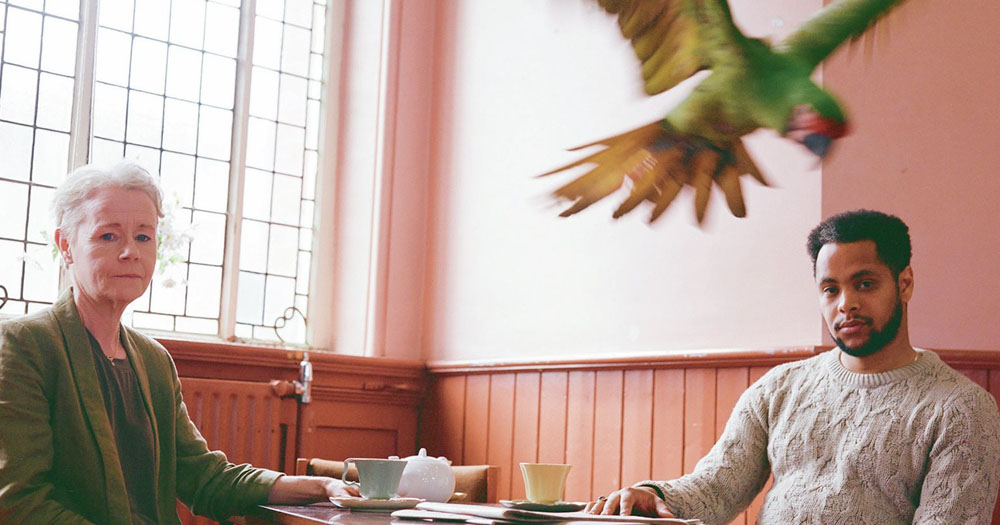Ahead of their new play Absent the Wrong, staging as part of the Dublin Fringe Festival 2022, writer Dylan Coburn Gray told GCN about the process of making a show about adoption.
I didn’t meet my birth grandmother until I was in my twenties. The thing I fixated on was that she had a tattoo, like me and my mother; I’d never had a grandparent who would get a tattoo before.
At that, I didn’t know my birth grandfather was Chinese until I was eight. In trying to explain that shift in self, I find the parallel with homophobia useful – not least because there was a lot of that too. A caveat: this is a parallel. It’s not an equivalence. But in both cases, the other eight-year-olds know before you do. In both cases, you have a period of reassuring yourself that the violence against difference is misdirected, mistaken, because you’re not really different. And in both cases, there is a reckoning when you have to own that there was no ‘mistake’.
Absent the Wrong, my new play about racialised people in the adoption system, is not exactly my family story. I’d be lying if I said it didn’t come from a personal place. The reasons are obvious. Perhaps it’s as obvious why I found the plot wound more and more tightly around a birth mother and daughter who are both queer, but this piece is written from my need to think it through a little more deeply.
Why queer protagonists? Well, why not? But it’s also because the queer relationship to time is like the adoptee’s: foreclosures and deferrals everywhere. I’m never going to do this, I did that early, I’m doing what you did in your teens in my thirties. Both are communities born subtly at odds with the straight-line trajectory of birth, boybands, marriage, mortgage, neighbourhood watch, death. If you crosshatch the two kinds of off-kilter time – the first queer romance later in life, the precocious self-awareness of an adoptee who knows they were a child in the world before their parents were parents – then they show more starkly.
Some people might be surprised that I describe adoptees this way. I can do no better than direct you to Claire McGettrick’s Illegitimate Knowledge: Transitional Justice and Adopted People. In it she writes: “Adopted people… are further disadvantaged in constructing their own life narratives because they are prevented from accessing their birth certificates and their personal adoption records.”
View this post on Instagram
Life narrative is more than felt; it’s external paper trail as well as internal myth. It’s how the state recognises us, decides to extend the benefits of citizenship or refuse them. How to get married without a birth certificate? Is it possible to make an informed choice about whether you want children if you don’t know what congenital health risks you run by doing so?
McGettrick’s paper also obliquely identifies the most potent reason to have queer characters at the heart of this story. She argues for a divestment from “the alleged psychopathology of adoption” as the grounds for adoption rights being granted. It’s vital to insist that being adopted is not necessarily a trauma, certainly not one that uniquely determines an adoptee’s life and self. Why? Because it’s true.
But what bothers me in particular about the psychopathology model is this: the idea that adoptees are uniquely traumatised is the reflection of the idea that blood families are uniquely wonderful. And all I can say to that is – Have you met any?
In my story where a birth mother and her daughter meet, I was at pains to avoid sentimentality about the magic of blood. Writing queerness into that scenario helps immediately establish a critical distance from The Family – stern fathers, martyred mothers, whatever the Irish equivalent of the white picket fence is. The Family is what gets invoked to justify destroying families as they actually exist.
Queer people know it well – hard to invest in The Family quite so much when your welcome into it is recent, conditional, revocable. The presence of queerness helps keep it clear that yes, this meeting is momentous – but it’s not the restoration of some perfect, beautiful, sealed union that was always meant to be.
This is a relationship where people learn from one another; it is not a relationship where people fix each other, because there’s nothing about them that needs fixing. They’re not broken. They never were. That’s the thought at the heart of Absent the Wrong. Or one of them anyway. Come along if you want to know more.
‘Absent the Wrong’ will be staged at the Abbey Theatre on the Peacock stage from September 13 to 24, 2022.
For more information and to book tickets visit www.fringefest.com.
This story originally appeared in GCN Magazine’s Issue 373, read more here.
© 2022 GCN (Gay Community News). All rights reserved.
This article was published in the print edition Issue No. 373 (August 19, 2022). Click here to read it now.
Support GCN
GCN is a free, vital resource for Ireland’s LGBTQ+ community since 1988.
GCN is a trading name of National LGBT Federation CLG, a registered charity - Charity Number: 20034580.
GCN relies on the generous support of the community and allies to sustain the crucial work that we do. Producing GCN is costly, and, in an industry which has been hugely impacted by rising costs, we need your support to help sustain and grow this vital resource.
Supporting GCN for as little as €1.99 per month will help us continue our work as Ireland’s free, independent LGBTQ+ media.


comments. Please sign in to comment.